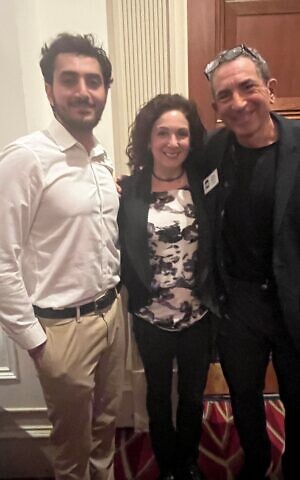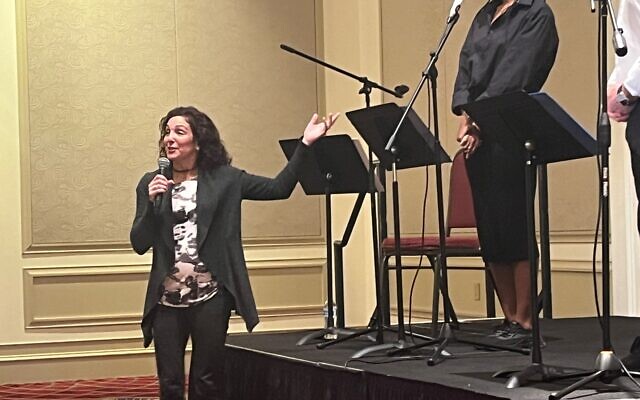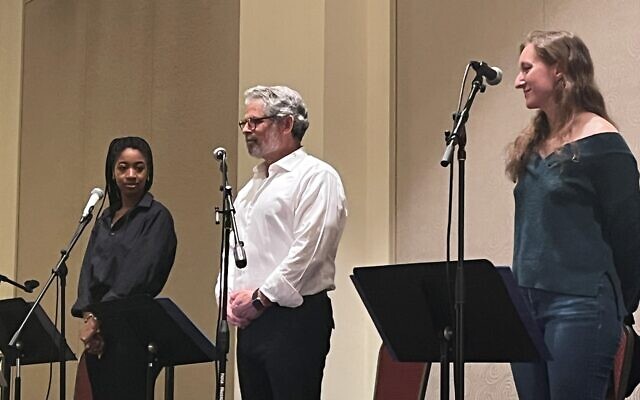One-Act Play Dances Around Death
Gold and Kimmel teamed up to premier a staged reading of an emotional original play.
After 37 years with the Atlanta Journal-Constitution and now with the AJT, , Jaffe’s focus is lifestyle, art, dining, fashion, and community events with emphasis on Jewish movers and shakers.
The Alliance for Jewish Theatre allows creative juices “aflowing” among playwrights, actors, directors and the like, to net-weave and produce meaningful art.
On March 26, director Pamela Gold, writer Hank Kimmel, and four actors brought to life, “May God Bless Her,” which dances around death, and the decisions we might have to make about it. The play was presented as a “reading” without benefit of staging and grand motions, but not without the emotions that align with decisions about if and when “to pull the plug” of life support. However, the story does have a lighter side as well, as “Jewish” pastry rugelach runs throughout as a symbol — who offers it, who eats it, who pledges to consume it in the future.

Given the power of attorney, 20-year-old Hannah (Faina Khibkin) must decide whether to keep her ailing mother alive, as her distraught father (veteran actor Brian Kurlander) along with a rookie hospital chaplain (Imani Vaughan-Jones) and young Sephardic Jewish physician (Adir Lev Mann) pull her in different ways.
As background, Kimmel and Gold co-led the Temple Connect theatre group that reads and discusses plays with Jewish themes and plans outings to see live performances.
Gold said, “During the height of COVID, Hank and I worked together with other Temple artists to present a virtual reading of short plays for the High Holy Days. As members of the Acting Ensemble for Working Title Playwrights, we worked together on the development of some of his other plays.”
Between an initial two-hour read-through of “May God Bless Her” over Zoom, and two additional in-person rehearsals, the group had rehearsed a total of seven hours.
For the March performance, Gold noted the challenges for staged readings with limitations on blocking, which plays a pivotal part in visual storytelling since actors are somewhat stagnant at music stands in fixed positions.
Gold explained, “As this play speaks to themes of faith, love, loss, grief, and the longing for connection, it was important to physicalize even small gestures like holding hands, a hug, or savoring a taste of imaginary rugelach can speak volumes.”

For Kimmel, his play is personal, as his mother died when he was 18. His father also became fatally ill when he was 20 but didn’t pass away for another 22 years. These events profoundly influenced the content of the play, being a part of a trilogy that Kimmel began in 1986 with, “The Chosen People.” This most recent work is the third and final part.
He stated, “Crafting a play, even a short one, takes me a considerable amount of time, which is why I intend to live a long and healthy life!”
Also an attorney, Kimmel conducts probate mediation and understands the importance of addressing end-of-life matters—legally, morally, and empathetically. While the play comes from his personal space, he observed from the audience’s response that these issues have broad appeal.
And what about the rugelach, be it rhubarb or chocolate? Kimmel uses it as a dramatic bridge. “Whenever I write a play, I consider incorporating a ‘charged’ object — something tangible that holds significance and impact for each character. Because rugelach is central in the first part of the trilogy (“Closing Time At The Bakery”) … I’d like to think that dramatic action can be traced through responses to the rugelach, as a cultural touchstone.”
Serving real rugelach at the play created a connection with the audience.
In terms of casting, three out of four actors are members of the Atlanta Jewish Artists Group. Gold said, “Atlanta has a close-knit theatre community, and artists are very supportive of each other and excited to bring new work to life.”
Portraying the young doctor, Mann said, “This piece delved into the theme of grief, which resonated deeply with me, having experienced the loss of my grandfather in childhood. Reflecting on the passage of time and the importance of cherishing moments with loved ones, the portrayal of a Sephardic character and the connection with Hannah underscored the beauty of our culture. Through my acting, particularly in ‘Prayer for the French Republic,’ I’ve had the privilege to represent my Israeli American Sephardic background, fostering awareness of the diversity within Judaism.”

The dénouement: Kimmel is contemplating writing another play about the relationship between the young doctor and Hannah and another between the 62-year-old father and Dr. Aucoin (an unseen character who treats the mother).
Rugelach anyone?
- Senior Living
- Arts & Culture
- Marcia Caller Jaffe
- Hank Kimmel
- May God Bless Her
- Faina Khibkin
- Brian Kurlander
- Adir Lev Mann
- Temple Connect theatre group
- Acting Ensemble
- The Chosen People
- Closing Time At The Bakery
- Atlanta Jewish Artists Group
- Prayer for the French Republic
- Dr. Aucoin
- Pamela Gold
- Imani Vaughan-Jones




comments